► The CAR guide to electric vehicle tyres
► How tyres for EVs differ from normal ones
► Expert insight on electric car tyre design
You’ve done your research and bought one of the best electric cars around but, after tens of thousands of miles, it now needs a new set of tyres. And, because buying tyres is about as thrilling as putting the bins out, you might be tempted to just buy a set of normal car tyres and be done with it.
However, doing that could be a bad move for your car, the new tyres, and your overall electric car running costs. For starters, buying a set of tyres designed for a conventional petrol or diesel car might not allow you to maximise the benefits and capabilities of your electric car; aspects such as handling, acceleration, refinement and comfort could all be affected – and some tyres may not last long in powerful electric car applications.
Crucially, the wrong choice of tyre could also cut the potential range of your electric car by some ten percent. A 200-mile-capable electric car suddenly becomes a 180-mile one, and you find journeys you’d previously completed without fuss suddenly requiring you to pull over and find a charger. Similarly, picking the wrong tyre could exacerbate issues such as reduced battery range in winter, making an EV harder to live with.
It’s subsequently a good idea to do some research on tyres for electric cars to ensure that you get something suitable, efficient and appropriate. Want to put the best tyres on your eco-friendly motor? Then read on to find out more about the best tyres for electric cars.
What are EVs really like to live with? Our panel of owners reveal all
Do electric cars have different tyres?
Ideally, yes. If you want to maximise the potential of an electric vehicle – EV – it’s a good idea to fit tyres that are designed specifically for that application, or at least approved for it. Electric cars are heavier than their petrol or diesel counterparts, which puts extra strain on the tyres.
As you’ve probably noticed, electric motors also produce a lot of torque, which further increases the demands made on tyres. Consequently, if you buy a regular tyre for your electric car, you may find that it wears more quickly than you expected and doesn’t provide the traction you need.
Moreover, maximising range is the ultimate goal of most EVs and the wrong choice of tyre could limit the distance you can drive on one charge. If you need a long-range electric car, and for its range to be reliable, tyre choice could make a significant difference.
When tyres are being designed for electric vehicles, factors that are often considered include:
- Aerodynamics: Range is paramount on EVs, so drag must be kept low to increase range.
- Durability: EVs are heavy and cornering forces higher; the tyres must be able to withstand this extra stress.
- Noise, vibration, harshness (NVH): Because EVs are so quiet anyway, an extra degree of refinement is required.
- Rolling resistance: The energy required to keep the tyre rolling must be kept low; EV tyres use special materials and design features to reduce friction and maximise range.
- Size: Thin, tall tyre sizes are common on EVs to reduce the frontal area (such as the Bridgestone tyres found on the BMW i3, which feature ologic technology).
- Weight: Though they need to be more robust, they also need to weigh as little as possible to avoid adding any unnecessary weight to an already heavy vehicle.
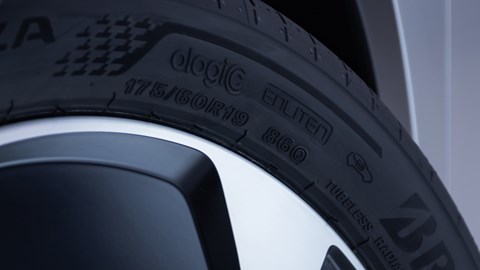 Tread patterns can also differ on EV tyres because the additional vehicle weight means less help is needed to displace water
Tread patterns can also differ on EV tyres because the additional vehicle weight means less help is needed to displace water
These specific requirements have caused many tyre manufacturers to create tyres specifically for electric vehicles. And while they might look similar to any other car tyre from the outside, the details and internal features can often be very different. Bespoke structures, tread patterns, sound-deadening materials, and more, can all help to set the best EV tyres apart from their ICE counterparts.
Tyres for battery electric vehicles, whether full EV or a plug-in hybrid (PHEV), also face the usual hurdles as regular tyres – challenges such as cost, durability, wet-weather handling, and noise. But the all-round package EV-specific tyres offer can be significantly better-suited to electric cars than that offered by a regular tyre. Some brands, such as Continental, are now also updating their entire line-up to ensure that they are suitable for use in electrified vehicles.
In any case, we advise you fit the tyres recommended by your car’s manufacturer.
The best electric car tyres available in 2023
Michelin e.Primacy
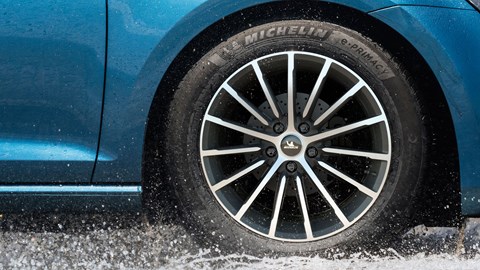
The Michelin e.Primacy is an accomplished tyre from a highly regarded brand. It’s designed specifically for electrified and efficiency-focused vehicles and is claimed to increase the range of an EV by up to seven per cent. The tyre, which is reputed to also offer excellent longevity and safety, arrived on the market in early 2021 and has since won several awards.
Pirelli P Zero Elect
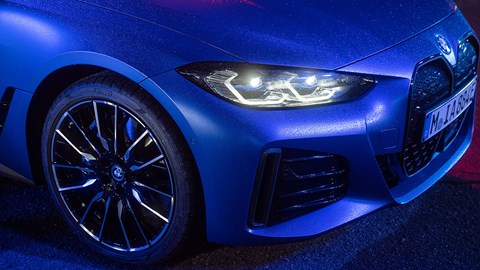
These are the factory fit for cars such as the impressive BMW iX and BMW i4 M50, which tells you a lot about their capabilities and performance. These specially engineered tyres are reputed to suit and complement EVs and plug-in hybrids, while also offering maximum performance.
Bridgestone Turanza Eco
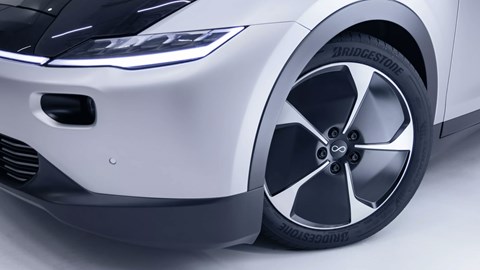
The Bridgestone Turanza Eco tyres feature the brand’s special ENLITEN technology, which reduces rolling resistance and weight. This makes them ideal for EVs, and you’ll find them as the factory fit on cars such as the Skoda Enyaq. The company also introduced the Bridgestone EV Marking on the sidewalls of these tyres, indicating the tyre’s tailor-made nature for EVs.
Continental EcoContact 6
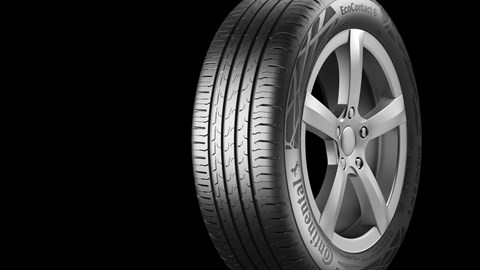
The EcoContact 6 features a high-tech silica compound that reduces its rolling resistance, helping maximise range, while features such as a foam liner help reduce noise. You’ll find these on cars such as the Mercedes-Benz EQA, which is also offered with WinterContact TS 850 P tyres for customers needing winter grip and traction. Continental also offers a dedicated Conti.eContact EV tyre, while its SportContact 5 Silent tyre is often used on Tesla electric cars.
Hankook Ventus S1 eco 3 ev
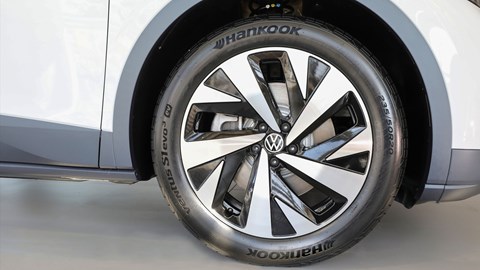
Selected by VW Group to furnish the ID.3, ID.4 and Porsche Taycan, Hankook is also the tyre manufacturer for the all-electric racing series, Formula E. These tyres feature characteristics that benefit EVs, such as lower weight, higher load-bearing capacity and reduced rolling resistance. The tyre compound has also been carefully specified to meet the high torque capabilities of electric cars.
Michelin Pilot Sport EV
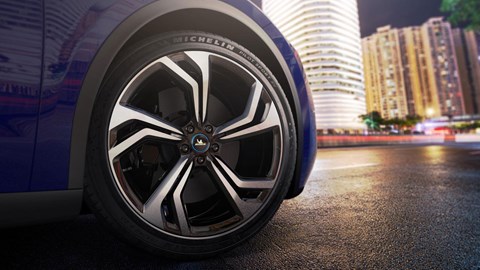
This tyre is the result of the brand’s experience in Formula E racing and it’s designed for electric sports cars. The company has also been selected by new EV manufacturer Lucid to supply tyres for the powerful Lucid Air EV, further demonstrating its credentials in the performance sector. The brand also supplies tyres such as the Michelin Energy EV, which you’ll find on the Renault Zoe electric hatchback.
FAQ: electric car tyre expert reveals all
Tyre manufacturer Bridgestone published a survey suggesting that half of European drivers are considering buying an electric vehicle but 37% are ‘still sceptical about doing so due to concerns around efficiency and limited range.’
However, the company has showcased special hyper-efficient EV tyres on the new Lightyear One solar-powered electric car, and it also bespoke EV tyres, which are designed to maximise the range of an electric car.
We interviewed Emilio Tiberio, chief operating officer and chief technology officer of Bridgestone in Europe, the Middle East, India, and Africa, to find out how Bridgestone is making EV tyres last longer and perform better – and how the new concept tyre will influence the types of tyres for electric cars.
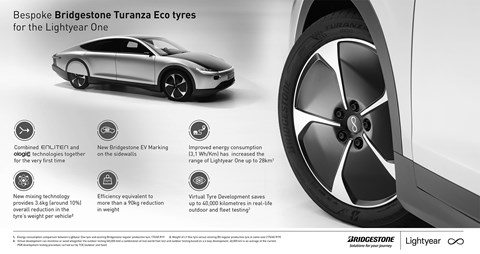
How did you develop the tyres for the Lightyear One?
‘We brought together two different technology packages for the first time: we used what we call ‘Ologic’ technology – tyres that are narrow but tall to reduce the aerodynamic drag. These 19-inch tyres with very high diameter have better rolling resistance and this means better battery efficiency.’
Super-skinny tyres can mean less grip though. How can you keep the handling safe if you use a narrow tyre for aerodynamics, like on the BMW i3)
‘The contact patch is going to be smaller and we don’t want a trade-off in grip. So we have a different pattern design, a different compound, different materials in the carcass to balance the stiffness of the carcass with the stiffness of the tread pattern. We had to re-engineer everything from scratch using the latest innovations in material science. We believe we can deliver a similar performance level with standard tyres of a bigger contact patch.’
EVs are heavy. Do they wear tyres out more quickly?
‘Electric cars are heavier, yes… But the durability is the same as on a conventional tyre in our tests. Customers have the same expectation as if they were driving a normal tyre and our EV tyres pass the 40,000km test.’
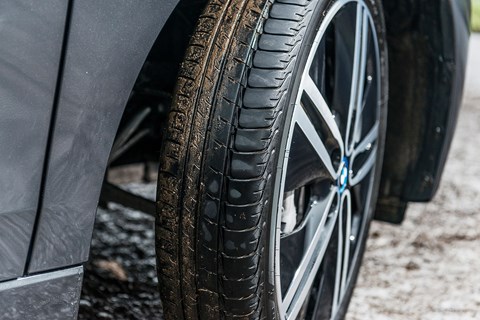
Why is weight important for EV tyres?
‘We also use our Enliten technology. We use this when we build very light tyres. It’s good for sustainability and we use fewer resources to make them. On the Lightyear One, it means we could reduce the weight of all four tyres by 3.6kg, which increases the range by 28km [17 miles] on one charge. This is significant.’
How do customers know a tyre is produced specially for electric cars?
‘This is the first time we’ve introduced an EV marking on the sidewall to say that this tyre has been designed for EVs. This will go on OE [original equipment] tyres.’
Don’t all cars need greater fuel efficiency and less rolling resistance? Aren’t the needs of conventional tyres and EV tyres converging?
‘We will keep two lines in the market in the future.’
Further electric car reading
Our guide to the best EVs on sale today
How much it costs to charge an electric car
The best long-range electric cars